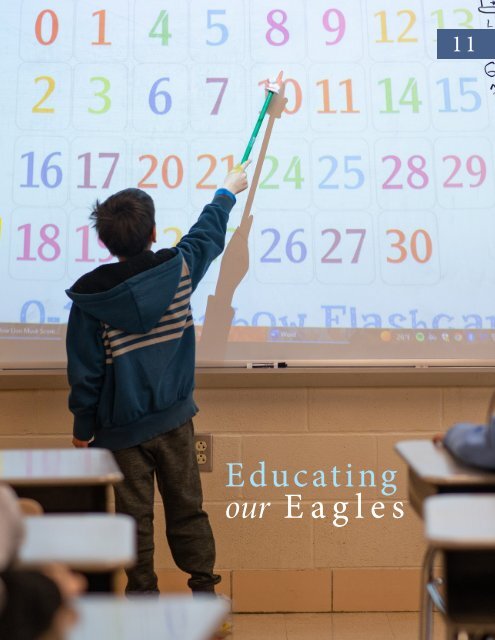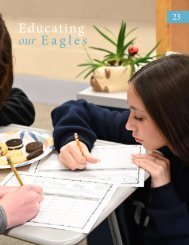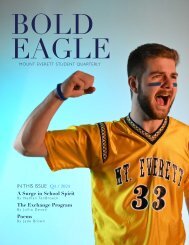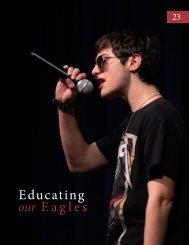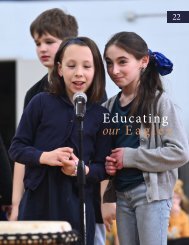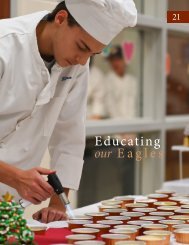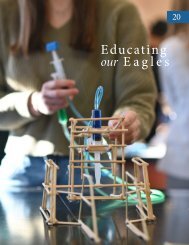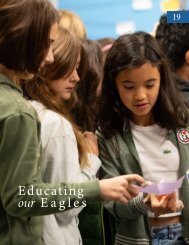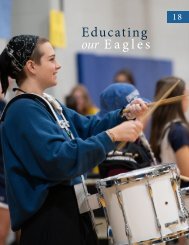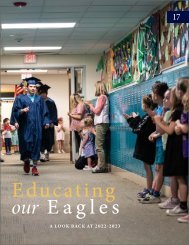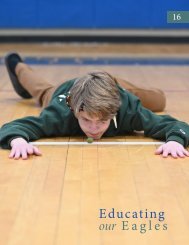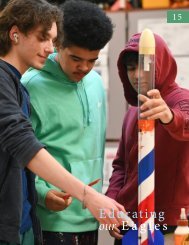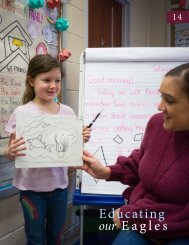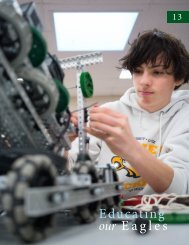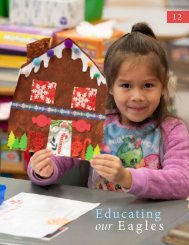Educating Our Eagles - Issue 11
Create successful ePaper yourself
Turn your PDF publications into a flip-book with our unique Google optimized e-Paper software.
<strong>Educating</strong><br />
our <strong>Eagles</strong><br />
<strong>11</strong>
CONTENTS<br />
4<br />
Introduction - Curriculum Director, Julie Dolan<br />
6<br />
High School - Small Ensemble Groups – Courtney English<br />
8<br />
High School - Les fables de Jean de La Fontaine – Pierre Léger<br />
10<br />
Eleventh Grade - Progoganda and World War One – Alex Izatt<br />
12<br />
Fourth Grade - Heredity: Where do traits come from? – Ashley Barrett<br />
15<br />
First Grade - Balloons Over Undermountain – Ashley Lotz & Christina Carlson<br />
16<br />
Pre-Kindergarten - Family Cookie Celebration – Kim Bleau and Jen Rossi<br />
Cover: UME student practices numbers, days of the<br />
week, and months in Spanish class.<br />
Right: Culinary student, Alissa works on a recipe.<br />
EDUCATING OUR EAGLES<br />
2
EDUCATING OUR EAGLES<br />
3
INTRODUCTION<br />
From SBRSD’s Director of Curriculum and Instruction, Julie Dolan<br />
Dear SBRSD School Community –<br />
As our first marking period ends, It reminds me that as administrators, we frequently<br />
have families ask how best they can support their child in school. So, in this<br />
edition, we took the opportunity to share some suggestions on how you can support<br />
your student in school and help them be successful.<br />
When reviewing your student’s report card ask questions<br />
• What did you do to get this grade?<br />
• Which study techniques worked for you and which ones did not?<br />
• What are you going to do differently next time?<br />
• How are you going to use this experience to be better next time?<br />
• What goal can you set for yourself for the upcoming marking period?<br />
Encourage good study habits<br />
• Ensure quiet time in your home- studies show that children need silence or<br />
music without lyrics to focus<br />
• Limit phone use- studies show they are a distraction if they are in the room<br />
even if they are off<br />
Prioritize sleep over other activities<br />
• Sleep is essential to learning and memory consolidation<br />
• Elementary school students need 9-<strong>11</strong> hours of sleep every night to be physically<br />
and mentally healthy and teenagers need 8-10 hours<br />
• Catching up on the weekend does not work because it throws off a child’s<br />
sleep rhythm compounding the problem<br />
Thought provoking questions<br />
• What courses interest you the most?<br />
• What are you thinking you would like to do after high school?<br />
• Is there an internship or course you can take at school to explore your interests?<br />
• What experiences could help you discover your passions?<br />
If you have any questions or concerns about your child’s progress, please reach out<br />
and email their teacher and set up a time to talk.<br />
Right: NMC Kindergarten students on a field trip<br />
to Norman Rockwell Museum<br />
EDUCATING OUR EAGLES<br />
4
5
HIGH SCHOOL:<br />
Small Ensemble Groups<br />
The high school band is preparing for their upcoming winter<br />
performances. During one of their performances, the Senior<br />
Citizen Luncheon, the band will break out into smaller groups<br />
to play winter pieces. They are working on balance, starting and<br />
stopping together as an ensemble, and what parts of the music<br />
are important to bring out.<br />
As a result of instruction, students will be able to:<br />
• perform in a small ensemble setting. Students will be able to start a piece of<br />
music on their own, play together musically, with a balanced ensemble listening<br />
and hearing all lines in the music, staying together and using self direction to<br />
end the piece together.<br />
Observations:<br />
Students enjoyed working together in smaller groups. Working in the smaller groups<br />
really allowed them to develop their listening skills. Listening is an essential skill in<br />
music ensembles.<br />
MA Standards:<br />
Novice Solo and Ensemble Standards<br />
Select, analyze and interpret artistic work for presentation. Identify basic strategies<br />
musicians use to practice and employ them in readying a musical work for performance.<br />
(N.M.P.04)<br />
Develop and refine artistic techniques and work for presentation. Perform with accuracy<br />
and expression works from the vocal or instrumental literature with a level of difficulty<br />
of 2, on a scale of 1 to 6; or a comparable scale. (N.M.P.05)<br />
Convey meaning through the presentation of artistic work. Match a musical performance<br />
with expressed intent (e.g., wanting the audience to identify with an emotion).<br />
(N.M.P.06)<br />
EDUCATING OUR EAGLES<br />
6
EDUCATING OUR EAGLES<br />
7
HIGH SCHOOL:<br />
Les fables de Jean de La Fontaine<br />
(1621-1695)<br />
Students studied the French fable “ La cigale<br />
et la fourmi” by Jean de La Fontaine. Based<br />
on the fable, as well as our class discussions,<br />
students engaged in conversations about the<br />
importance of money in our lives. Should<br />
saving be a priority (la fourmi), or should we<br />
be spending our money doing the things we<br />
enjoy without thinking of tomorrow (la cigale)?<br />
In an effort to learn and recite the fable,<br />
students put on a puppet show for their peers.<br />
They created decor and puppets to act out the<br />
fable. Students then recited the fable to the class.<br />
At the conclusion of this unit, the decor,<br />
puppets, fable and some pictures are on display<br />
on a bulletin board in the hallway. QR codes<br />
are available for people to listen to the fable<br />
recited by students.<br />
As a result of instruction,<br />
students will be able to:<br />
• understand the main idea and some<br />
supporting details.<br />
• make comparisons of basic language forms.<br />
• memorize and recite a fable in French.<br />
MA Standards:<br />
(IM.1.b) (IM.6.b.2)<br />
Les fables de Jean de La F<br />
ontaine (1621-1695)<br />
La cigale et la fourmi<br />
La cigale, ayant chanté<br />
Tout l’été,<br />
Se trouva fort dépourvue<br />
Quand la bise fut venue.<br />
Pas un seul petit morceau<br />
De mouche ou de vermisseau<br />
Elle alla crier famine<br />
Chez la fourmi sa voisine,<br />
La priant de lui prêter<br />
Quelque grain pour subsister<br />
Jusqu’à la saison nouvelle<br />
« Je vous paierai, lui dit-elle,<br />
Avant l’oût, foi d’animal,<br />
Intérêt et principal. »<br />
La fourmi n’est pas prêteuse ;<br />
C’est là son moindre défaut.<br />
« Que faisiez-vous au temps chaud ?<br />
Dit-elle à cette emprunteuse.<br />
Nuit et jour à tout venant<br />
Je chantais, ne vous déplaise.<br />
Vous chantiez ? J’en suis fort aise.<br />
Eh bien : dansez maintenant.<br />
EDUCATING OUR EAGLES<br />
8
Flashez-moi !<br />
Flashez-moi !<br />
Moi aussi !<br />
EDUCATING OUR EAGLES<br />
9
HIGH SCHOOL:<br />
Propaganda and WWI<br />
In this lesson we will learn about propaganda and how it was used during WWI<br />
We start off with using an "Answer Garden" with the question "What does propaganda mean<br />
to you" just to get the ball rolling, this works as our Do Now for the day. I'll discuss our classes<br />
answers and then lecture a little bit (maybe 10 minutes) on propaganda, how you would define<br />
it, specific examples of it, and how it played a role during WWI. I'll show specific examples of<br />
WWI propaganda from the Smithsonian and some current day ones too. Then we will read a<br />
short article together on the history of propaganda and how it relates to WWI. We will then have<br />
some discussion questions related to the content we've discussed so far and have them turn &<br />
talk with a partner about them. After we've sufficiently discussed propaganda I will assign our<br />
project that will sort of work like a multiple day Exit Ticket. The students will be making their<br />
own propaganda, whether that's in the form of a political cartoon, poster, radio ad, Tik Tok or<br />
commercial. This propaganda will be based around WWI.<br />
Enrichment*: I gave the students a link to a podcast on propaganda if they wanted to learn more<br />
about it.<br />
As a result of instruction, students will be able to:<br />
• define propaganda in their own words.<br />
• recognize examples of propaganda.<br />
• recognize different strategies of propaganda.<br />
• recognize the uses of propaganda (both positive & negative).<br />
• understand the specific uses of propaganda in WWI and how/why it was used.<br />
• create their own form of propaganda.<br />
Observations:<br />
This lesson kept the students engaged for the most part. They really liked the specific examples of<br />
WWI propaganda and they enjoyed creating their own. The article lost their interest a bit, but it was<br />
fairly short so it didn't derail the lesson. They seemed to enjoy the Answer Garden and how they<br />
could see everyones answers up on the screen.<br />
MA Standards:<br />
c. the impact of war on the home front in Europe, including the conscription, war<br />
propaganda, rationing, and government control of wartime industries<br />
b. censorship of the press and propaganda<br />
d. use of art as propaganda, promoting classicism and disparaging<br />
modernism as degenerate<br />
EDUCATING OUR EAGLES<br />
10
The Woman's Land Army of America--Training school, University of Virginia--Apply Woman's Land Army, U.S.<br />
Employment Service, Richmond, Va. / Herbert Paus.<br />
EDUCATING OUR EAGLES<br />
<strong>11</strong>
ELEMENTARY SCHOOL:<br />
Heredity: Where do traits come from?<br />
Students learn where traits come from in humans, plants, and animals. They will learn about<br />
Acquired Traits, as well as Inherited Traits. At the end of the lesson, students will use Google<br />
Docs to divide up the given traits into the correct type of trait. Then they will complete the<br />
monster maker activity to explore how genes work.<br />
As a result of instruction, students will be able to:<br />
• provide evidence, including through the analysis of data, that plants and animals have traits<br />
inherited from parents and that variation of these traits exist in a group of similar organisms.<br />
Observations:<br />
The students really enjoyed the Google Doc activity as well as the monster maker. They were really excited to<br />
see what the monster would look like based on the clues they had to solve.<br />
MA Standards:<br />
3-LS3-1
ELEMENTARY SCHOOL:<br />
Family Cookie Celebration<br />
During the month of November our classes have been learning about family,<br />
friendships and being thankful. As a part of the unit we learn about family<br />
recipes, traditions and ways we all celebrate, The two classes made cookies<br />
at school using a recipe, and created invitations that were sent to the families<br />
inviting them to come and enjoy each other and celebrate together. It was a great<br />
turn out and we had a lot of fun making and especially eating the cookies.<br />
As a result of instruction, students will be able to:<br />
• learn about families and friendships.<br />
• work together as a team to organize the day.<br />
• follow a recipe and use the cooking utensils.<br />
• learn about and meet people from our community.<br />
Observations:<br />
The classes did great working together<br />
MA Standards:<br />
RL. PK1-7.10, RL. PK 1.6 and 7, SL.PK 1-4.6, I.PK.1d,5a,c, 6,W.PK -2, PK.CC1 and 2<br />
SI.PK1.3, PK.MD.1.3<br />
PK.MD.1, PK.G1,2, RI.PK.7<br />
EDUCATING OUR EAGLES<br />
13
ELEMENTARY SCHOOL:<br />
Balloons over UME<br />
The first grade students learned about the Macys Parade and how the<br />
tradition began with immigrants missing their cultures and customs<br />
from their home country. We read "Balloons over Broadway" and<br />
"Milly and the Macy's Parade" to learn about the history of the<br />
parade, how the balloons have changed over time and how traditions are<br />
formed. Students choose a balloon to create and wrote a opinion writing piece<br />
persuading the audience as to why their balloon would be a good choice to<br />
be in the parade. The first grade celebrated this unit by creating a "balloon" at<br />
home with their families and paraded around the school.<br />
As a result of instruction, students will be able to:<br />
• learn about opinion writing, traditions and the meaning of "immigrant".<br />
Observations:<br />
The students were highly engaged in this unit. They demonstrated their<br />
understanding of immigrants and traditions, as well as opinion writing and the<br />
writing process of a rough and final draft.<br />
MA Standards:<br />
ELA, SS<br />
EDUCATING OUR EAGLES<br />
14
EDUCATING OUR EAGLES<br />
15
EDUCATING OUR EAGLES<br />
16


